Spirit Of Humanity Forum

What a privilege it was to be invited to take part in the Spirit of Humanity Forum in Reykjavík, which was celebrating its tenth anniversary this year!
A gathering of leaders from the four corners of the world to meet for a few days in this land of ice and fire, where raw, untamed nature reminds us of its omnipotence and our infinite vulnerability…
As a co-founder of SOHF Switzerland and a member of its Strategic Circle, I was able to experience the anchoring and realignment of our inner compass on the essential values that define us as “human beings” and as “human doings”!
How can I express the deep joy and emotion of so many wonderful encounters?
Thank you to Life!
To find out more, click here: https://lnkd.in/eTSRcnmJ
Sur une lumineuse orbite qui me porte depuis 2019, j’ai le bonheur d’être membre fondateur et membre du Cercle Exécutif du SOFH – Spirit of Humanity Forum Geneva.
Le Spirit of Humanity Forum est un puissant mouvement né en Islande il y a 10 ans, dont la mission est de donner la priorité à l’ETRE avant le FAIRE !
Sa vocation est de rassembler leaders et dirigeants de ce monde autour de thématiques et de personnalités porteuses de cette cohérence, lors de forums tenus tous les deux ans, en d’autres termes « Resetting the compass towards core human values », afin de leur permettre d’aligner leurs actions sur leurs valeurs essentielles, et de garder le cap dans le cadre de leur profession – quelle qu’elle soit – au service du Greater Good.
« Towards a loving world » « Leadership and Governance for well-being » ont été les thèmes de la cinquième édition qui s’est tenue en Islande en juin 2021 !
Site internet: www.sohforum.org
NEWSLETTER DECEMBER 2021
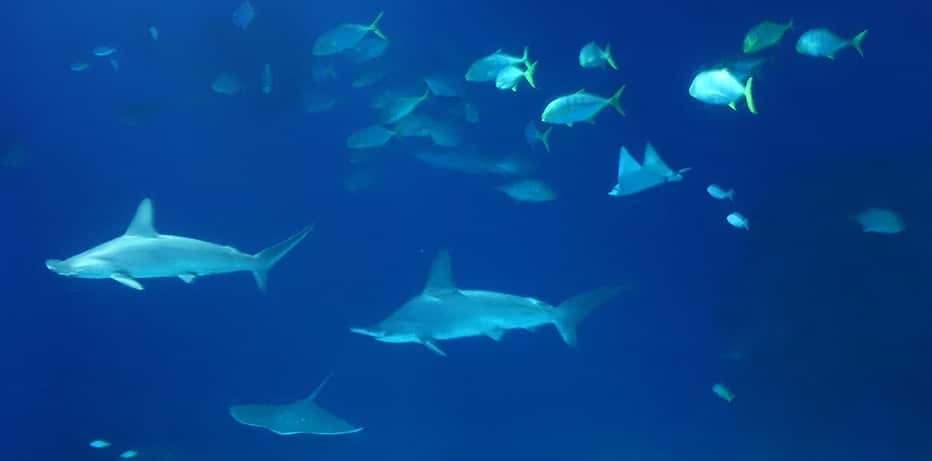
Is peacefulness and grace our true nature?
Together with a friend, I recently visited the impressive aquarium in Copenhagen, The Blue Planet. It is a spectacular creation, breathtaking. What touched us most was the calm in which all the animals seemed to live together. Like watching a graceful dance choreographed by an invisible hand, the fish was swimming around, diving and rising, playing, resting and moving again in slow movements and naturally respecting boundaries. All kinds of creatures living together in different tanks were moving about without tension. We found sharks, rays, mackerels, and other small fish engaged together in this delicate slow dance in peace. Like an original order, a way of living together which is at the core of our being. It is time for us to return to a dance of peaceful co-existence.
The Blue Planet
Lotta Arbman
Secretary, Spirit of Humanity Forum
A gift that strengthens you on the inside
Invitation to a workshop

The Heartful Leader
Leading and working from the heart = wellbeing + compassion + integration
Designed to help leaders and change-makers access and integrate the infinite resources of their hearts. Simple techniques will show us how to reduce stress, improve overall health and wellbeing, clear the mind’s clutter, and let go of negative and unhealthy habits which hold us back. These heart-based resources promote clarity of mind and the ability to be present in each moment, enabling better decision making and increasing self-compassion and compassion for others. The workshop is an invaluable contribution from Dr Hester O’Connor & Judith Nelson, who will facilitate.
Enjoy a profound, experiential workshop with time for reflection and interaction
ONLINE via Zoom
Tuesday 14 December at 16.00-17.30 GMT
Free of charge as per the ethos of the Spirit of Humanity Forum
W E L C O M E
Launch of Global Humanity for Peace Institute
We are delighted to share the following news:
The Guerrand-Hermès Foundation for Peace, the University of Wales Trinity St David, and UNESCO (Social and Human Sciences Section) jointly launched an international think-tank, Global Humanity for Peace Institute, on 18th November, at the occasion of the University’s Founders’ Day 200 years ago. The Institute will benefit from all the research facilities and educational resources offered by the University, but will also have its own autonomy.
Dr Scherto Gill, a Board Member of Spirit of Humanity Forum, will serve as the Institute’s inaugural Chair and Director, and she will be facilitating the Institute’s ongoing activities.
Briefly, Global Humanity for Peace Institute will focus on the following:
- Instilling an ethic of love in worldwide communities and institutions to advance social justice and global solidarity;
- Fostering collective healing (including healing the wounds from past atrocities and the wounds of our planet), enriching community regeneration, and advancing social justice and global solidarity, and providing professional development opportunities to facilitators of collective healing and community regeneration;
- Empowering youth leadership, and nurturing youth transformative competences;
- Harmonising holistic human well-being with our planet’s flourishing, and supporting the development of governance processes that are values-based, dialogic and well-being sensitive;
- Encouraging educational transformation and inspiring a culture of care in educational institutions;
- Creating spaces for deep encounter, deep silence, deep listening, and deep dialogue for engendering greater harmony amongst all that is.
Spirit of Humanity Forum looks forward to our continued collaboration with the GHFP, and the new Institute.
Press Release HERE

The importance of our non-physical needs
The Peace Literacy Institute has arrived at very interesting conclusions about our basic human needs, conclusions very different from Maslow’s Hierarchy of Needs.
“Our research in Peace Literacy shows that people have many non-physical needs that are as important, if not more important, than their physical needs, especially when navigating struggle, uncertainty, and crisis. We’ve put together this series to discuss what these non-physical needs are, how people can meet them (and help others meet them) in healthy ways, how people during a crisis can become more vulnerable to tangles of trauma such as mistrust, rage, alienation, and helplessness, and how we can deal with trauma constructively rather than destructively. Each entry in this series [linked below] will focus on one of humanity’s non-physical needs, along with practical ideas to help us create stronger relationships and communities.”
Higher purpose will increase your courage, motivation, and resilience – your fuel
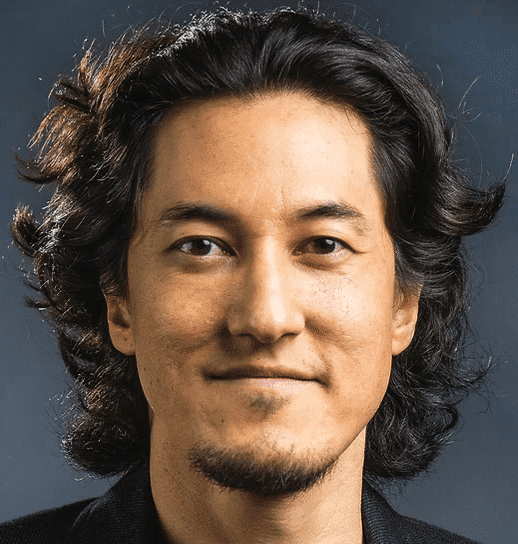
Paul K. Chappell founder and executive director of The Peace Literacy Institute is a man who has gone though stark life experiences and come out on the other side as a powerful peace advocate. Paul is a very clear communicator, watch his description of our Non-Physical Human Needs and Why our world need peace literacy
“Higher purpose by itself will not give you the many strategies and skills that you need to overcome adversity (we have a lot of ideas in our Peace Literacy curriculum to give you these strategies and skills). But having a higher purpose will increase your courage, motivation, and resilience – your fuel – so that you can use these strategies and skills to the best of your ability during a crisis, and create stronger relationships and communities as you navigate through the storms of life.” Paul K. Chappell
The Peace Literacy Institute offers
A Leadership Series
to Navigate Struggle, Uncertainty, and Crisis
A Winter Workshop Online
Healing Trauma, Navigating Technology, Protecting Humanity’s Future
Starting 12 December
The love story that shocked the world
and conquered prejudice
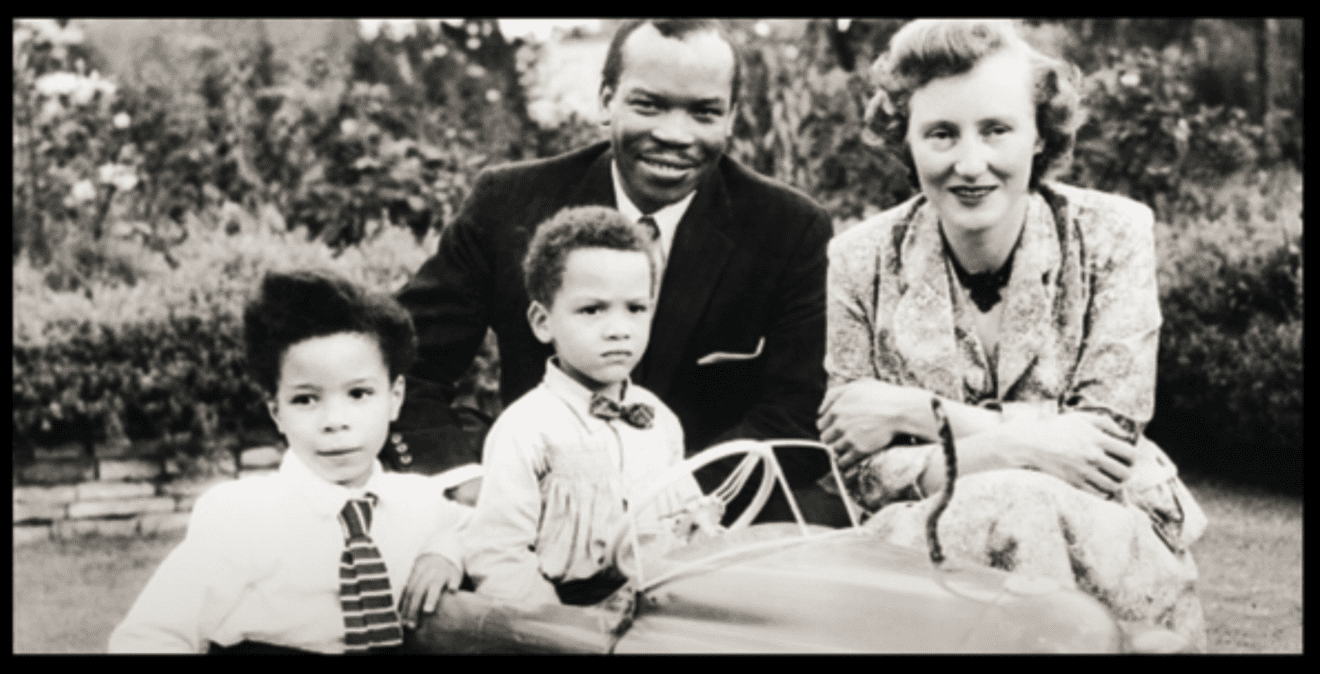
‘A United Kingdom’ is a film which unveils a remarkable story. It is a great surprise that these events in history are not more known to us. From BBC News: When an African prince and a white middle-class clerk from Lloyd’s underwriters married in 1948, it provoked shock in Britain and Africa. Seretse Khama met Ruth Williams while he was a student at Oxford University. After his studies, he was supposed to go home to the British Protectorate of Bechuanaland (now Botswana) and marry someone from his own tribe, but his romance with Williams changed everything. His family disapproved, and Khama was forced to renounce his claim to the throne. The British government came under pressure to show its disapproval, and Khama was exiled from his homeland. In 1966 Bechuanaland achieved independence as the Republic of Botswana. Sereste Khama was democratically elected the country’s first president, and as such, he promoted his ideal of a multiracial democracy. Ruth became a prominent humanitarian. Devoting her life to the fight against aids, helping disadvantaged women and children, and the struggle against racism. Khama was reelected to successive terms and served as president of Botswana until his death. Their eldest son, Ian Khama, became president of Botswana in 2008.
Nelson Mandela described their legacy as ‘A shining beacon of light and inspiration’.
VIDEO BBC News Witness spoke to Ruth Williams’s sister about the love that conquered prejudice.
A film worth watching ‘A United Kingdom’

Imagine prisons as centers of healing and rehabilitation. Transform prisons and communities through compassionate action.
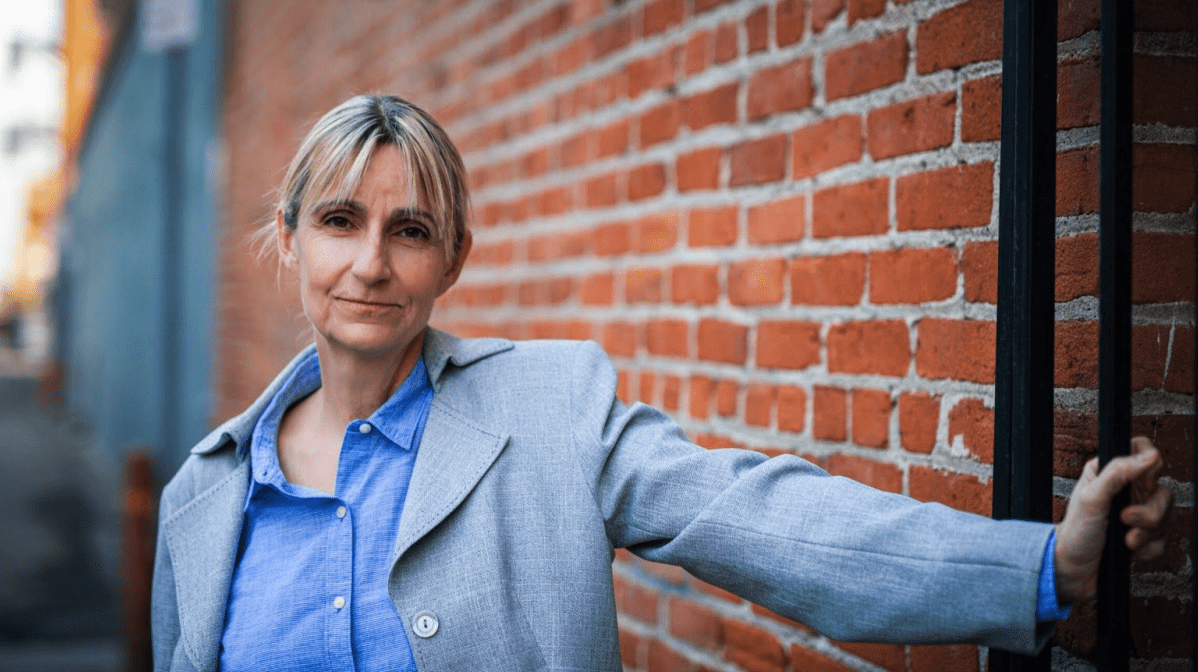
A courageous leader with a powerful mission rooted in her own inner work
Fritzi Hortsman is the Founder and Executive Director of the Compassion Prison Project an organisation dedicated to bringing compassion, childhood trauma awareness and creative inspiration to all men and women living behind bars. Compassion Prison Project began as the brainchild of award-winning producer Fritzi Horstman, whose own childhood trauma helped shape its conception. Over the course of several months in 2019-2020, Fritzi and a dedicated team of facilitators and volunteers partnered with incarcerated men at a Kern Valley State Prison (KVSP), a maximum-security prison in Central California. Together, they created powerful tools to address and heal from childhood trauma.
Trauma Talks
Since the COVID-19 lockdown, she has developed a COVID curriculum called Trauma Talks, which includes a workbook and a video series. As part of the series, she talks about her own trauma and offers strategies for developing resilience. In addition to her workshop curriculum, Horstman also hosts a podcast, where she interviews prison officials, thought leaders, and trauma experts. Watch HERE
Healing herself
As for the impact of understanding adverse childhood experiences (ACEs) in her own life, she says: “I started to realise I needed to look at my behaviour and at my own thoughts. I was completely numb. I was disassociated.” As a mother herself, she became hyper-vigilant, describing herself as ”a mother on edge.” Her work with prisoners has helped her achieve clearer direction. “Now I’m more available to my family and to my project,” she says, which includes more than a dozen team members and more than 100 compassion ambassadors who support the organisation’s efforts. “I’ve got a whole prison system to fix,” she says.
Upcoming
Fritzi Horstman and Compassion Prison Project are in production with their new trauma-aware 12-part video series designed for men and women living in prison. The series is accompanied by a workbook. The program is being piloted in various prisons in the United States and countries around the world.
PACEs Connection – article
Honour Yard – a glimpse of transformative work at a high security prison in California

Discover the ‘Cultivate the Soul Podcast’
Listen to great stories by leaders who discuss how they are bringing inner work to outer action and the impact this creates, by our friends at Synergos.
A musician passionate about kindness

Originally from Montréal, Canada, Autumn Studios’ founder, Mark Fenster, began with a dream common to many songwriters – to inspire a better world with his songs. His own songwriting focuses on world peace, harmony, loving tolerance, and the ultimate discovery of our own unique beauty & universal connection.
Specialising in Music that promotes a positive message, the creative team of Autumn Studios includes World Musicians of Multi-Cultural Instruments, and some of the finest talents found in our industry. Our recordings can be heard on radio, television, film, Jessie Award Winning theatre scores, live concerts and steaming everywhere. Mark was recently honoured with a Lifetime Achievement Award in the areas of Music & Peace by the Visioneers International Network where he was also introduced to the Spirit of Humanity Forum.
In response to our inquiry for his reflections on the our theme ‘Towards a Loving World’ we received the two songs below with his explanations. Thank you Mark!
The story of “Colours”
This song begins at the end of the world, caused by humans at war due to intolerance of our differences The story outlines the mystery of our love of all colours of nature, except in human nature, and it shows how with just a little hint of possible, and a new perspective, we can all begin to walk together and truly celebrate nature’s rainbows, including and perhaps especially the human rainbow 🙂
As we accept our differences as natural, perfect designs by Nature, we move from fear to interest and intrigue. Joy replaces fear. We live and grow so beautifully so much as the team of different parts we are, perfectly designed by Nature, human rainbows. Listen HERE
The story of “Peace Blessing”
Originally called “The Priestly Blessing”, this ancient prayer was offered by the high priests in ancient times to give people peace, and is still today offered by priests, imams, ministers and rabbis alike to their congregants, as well as by parents to their children at bedtime. The essence of this blessing is an offering of Peace & Love and is as much a joy to receive as it is to share. The music and universal translations create a beautiful space to share these meaningful words and wishes, for any and all people of all cultures and religions to join in. The refrain offers an opening for everyone to sing along with any words that mean “Peace”, and in any language or melody they may wish. Somehow, as with Universal Love of Spirit, there’s space for us all! My wish is that this somehow may be sung and shared as a bridge to reunite us all in the very peace and love we all have inside, as we were likely meant to be. Listen HERE
Choose courageous kindness over fear and hatred
Mark Fenster talks from his life experience Watch HERE
Supporting the innate clarity of our children

Notice something you can do. Without someone asking you. It may please you just as much. As the others’ hearts you touch. This is the only text in this book, followed by a variety of beautifully illustrated scenarios, perfect for an early conversation with our children to explore the meaning of kindness. Children are often clearer than adults about these life-sustaining principles, so opening the dialogue with our young ones from the very beginning is a great way to nourish and support that clarity. Read MORE

Trauma is the big topic these days. Here is another big event
Free & Online: 3-9 December
Hearfulness launches a meditation app
HeartsApp!
HeartsApp by Heartfulness facilitates guided practices of Heartfulness tools; relaxation, rejuvenation, and meditation with the yogic transmission. It enables you to find your inner self and connects with your heart.
Read MORE

Spiritual Practice offered by the Fetzer Institute
Humility

Person in forest riccardo-mion-unsplash
Pay attention to how you share space with others. Do you spread your stuff around? Do you place your things on the empty chairs beside you? Do you move them when someone else enters the space? Do you diminish your own needs by squeezing or twisting yourself to make room for others as if you don’t have the right to be comfortable?
Read MORE
The GHFP sponsors several significant projects under the theme of
Healing

Healing has been one of the major concepts in global peace and well-being, aimed at relieving the suffering of trans-generationally transmitted traumas, and addressing the deeper roots of violence, towards justice, equity and holistic and positive peace.
The causes of violence are often located in recent, but also older and even ancient, historical grievances and traumas. When drawing on perceived injustices, these psychological roots can become sources of violence, especially in acute times of crisis, fear and threat. These driving forces usually remain un-examined. By unfolding and deconstructing them, people can begin to see how systemic dehumanisation has been so deeply seated that it can become in part the narrative some communities have chosen to live by.
Through the pathways of encounter, dialogue, listening, re-storying, compassion, forgiveness and other similar processes, individuals, groups and communities can embark on collective healing journeys. Healing, reconciliation and social justice go hand-in-hand in the processes of transforming conflict and building holistic peace.
“Reconciliation cannot be aimed solely towards ending current conflict. It must also aim to include unburdening of the past, liberation from the pains and angers that made conflict seem inevitable in the first place.” — Prof Garrett Thomson, CEO
Developed by Höfði Reykjavík Peace Centre, University of Iceland
A course in Intercultural Competency

Increased immigration has led to greater interpersonal cross cultural encounters and heightened cultural concerns. Because of this all school levels are facing complex challenges in adjusting their services to an increasingly diverse student population. It is therefore of great importance that employees at all school levels are culturally competent and can adapt their services when working with people with diverse backgrounds. The e-course, Intercultural Competency in Education is sponsored by Nordplus Horizontal and is specifically aimed at teaching intercultural competency to educators.
- The importance of self-awareness and curiosity as a way towards intercultural awareness
- Awareness of the impact of negative generalisations
- How to deal with contradictions when identities are constructed
- How to become aware of your own influence on students’ identities, and to develop strategies to deal with identities in a fairer and more coherent way
- The importance of promoting understanding through respect for intercultural dialogue and the value of different languages
Special event in Jerusalem: Festival of Lights
Christians, Muslims and Jews together

Join Elija Interfaith Institute for a special gathering of Praying Together in Jerusalem:
Christians, Muslims and Jews will gather at
the Fuchsberg Center, Rechov Agron 8, Jerusalem
for shared learning, prayers, candle-lighting and celebrations.
Teachers will include Rabbi Joel Levy, Reverend Richard Sewell, and Mohammed Said Abraham As’ad, with music by Hanna Yaffe.
Thursday 2 December at 5 pm Jerusalem time
10 am EST
3 pm UK time
4 pm Central European time5 pm Israel time
8:30 pm India time
Please note that it begins one hour earlier than in summer.
Save your spot by signing up here.
You are welcome to join in person or on Zoom.
Spiritual practice – what makes my heart expand?
A simple but powerful reflection exercise.
We live in a world where our heads are often given predominance over our hearts, but our hearts holds the key to our courage and generosity. So, let’s open the door to our hearts. Take a pause with paper and pen, and maybe a cup of hot tea, to reflect on the following questions. An exercise of self-care which can bare fruit in many fields. You may be surprised. An opportunity to connect with and strengthen your authentic self.

- What are my thoughts and feelings at the moment?
- What in my life are the things that make my heart grow, expand, and feel happier? (thoughts, words, activities, relationships and connections)
- What in my life are the things that make my heart shrink?
Can I make a simple daily plan for myself to include the things that make my heart grow?
Reflections from our friends
On the our current theme:
Towards a Loving World, leadership and governance for well-being
A loving world depends on the understanding that diversity is a fact and inclusion is an act. It is important to promote multiple identities where respect, understanding and acceptance is paramount
– Amjad Mohamed-Saleem
Leading towards well-being elicits an image of mindfulness and compassion for humanity and the world itself. Long-term orientation with sustainable strategy is necessary to love the world: it is beyond country, race, ethnicity, and gender expression, beyond language and dialect, beyond self. At the same time, as we live in a complex world, convergence and governance are necessary. Not all leaders seek world healing or well-being for folks outside their country’s borders or even the district’s invisible boundary lines. The Spirit of Humanity Forum makes a conversation and vision like this possible.
– Lori Halverson-Wente
Within our consciousness is an awareness that a world of mutual care and compassion will lead us into extraordinary ways of being and living together. Efforts that challenge each of us to explore the potential of living lovingly together provide immense hope to our life on this planet.
– Christopher Bullock
Can we start moving towards a loving world by practicing_inhabiting our bodies?
How are we in our bodies? How are we feeling (in) our bodies?
How do we stand? How do we move_relate? How fast_slow? How do we gaze at each other?
How do we lead our sensing attention?
Are decisions emerging from disembodied power?
Can decisions emerge from fully embodied shared attention?
Are we present in being? Are we welcoming being_with?
– Catarina Trota
Shouldn’t we install a universal, UN-like ‘body’ of leadership, defining universal leadership principles and practices of ‘high standards’? Leaders can be praised for their high ethical qualitative leadership or judged for the lack of it by an international board.
– Olivier Onghena-‘t Hooft
Leaders need to have no interest in taking advantage of institutions’ management, be it economic, intellectual, political, moral, or other.
– César R. Sevilla
Leadership needs to focus on resonance for the whole organisation.
– Pernille Storm Faxe
We, intelligent humans, have a lot to learn from animals and vegetation. Coexistence is the main theme in these parallel kingdoms where central command and all the rest being followers seldom exist. The balanced ecosystem cycle exists there at best. We humans have to dissolve classifications and coexist. It means easy adaptability, no biases, and finally, collective leadership. Governance cannot only be following laws and authority. It can work better through joint ownership, collective drive for decisions, with well-being and love as the primary fuel for growth.
– Anurag Jain
In a circle, no one is the leader. And if no one is the leader, we must learn to guide, assist and help each other, like in the shamanic wisdom and practice.
– Anja Mays
I believe that the world we live in right now is in need of love towards the world around us and more specifically towards each other. Away form the ego-models of ‘exchange’ and/or ‘extract-use-dispose’. The theme of the workshop ‘the Heartful Leader’ sounds like one that might help us / me to find direction in that search of how to care unconditionally for one-another and our world.
– Joep C. de Jong
Personal empowerment is critical. How be liberated from fear-driven social and economic decisions?
– Enrique Miles
For me, leadership for a loving world is a top-down and bottom-up process at once with love on both sides. This progressive process is to be owned by all of us simultaneously at the same level.
Love unites. Love is our essence. Love manifests everywhere if we want to. Love as the top value could be a starting point: How does love manifest at work, between people, between nations?
All the animals are in the human being and manifests, said CG Jung.
This process would require a deep change of paradigm.
But let’s try!
– Jean Debrosse
Love is a prerequisite for our global well-being and dynamic governance for an effective Leadership style that serves humanity!
– Markos Perrakis
As I change within, my vision of the world changes. Be the loving change you wish to see in our world family.
– Masana De Souza
A loving world and well-being for everyone are what most human beings want. We need to find a way to ignite love inside and let it guide our actions and interactions. Letting go of all fears, doubts and other false barriers. We need to spread the hope, the faith that it is possible, even easy and fun to live our lives in such a unique and meaningful way.
– Encarna Cuevas
La civilización del amor enseña cuida protege y sana las relaciones humanas y construye vínculos poderosos redes de instituciones y personas.
Autónomas que trabajan para cubrir las necesidades más profundas de los seres humanos.
The civilisation of love teaches care, protects and heals human relationships and builds strong links between institutions and people.
It works independently to meet the deepest needs of human beings.
– Marta Paillet
When the power of love overcomes the love of power, the world will know peace (Jimi Hendrix)
– Marc Vossen
We need to shift from I to We, not just in our minds but in our hearts. We need to listen to our soul notes, the soul notes of others and learn how to harmonise with each other and co-create the magnificent world we can build together. Our lived experience of interconnection is the pathway I see for our world. We need social flourishing, practices that go beyond the intellect, practices that include the heart and soul to co-create well being for all. Each of us, all of us, have the power to generate empathy and connection. For me, it is about Finding Us in Music, the most effective pathway to ensure the well-being we all deserve.
– Barbara Nussbaum
‘Love HIM who Loves All, Love All whom HE Loves’ is my favourite quote
– Sakthidasan MS
Coexistence and conviviality (against conflict and violence) are the main traits of the new society most citizens want. This is the crucial challenge of the years to come.
– Leonel Narvaez

A recipe from our director Jóhanna Vilhjálmsdóttir
Jóhanna’s Peppercookies
(Icelandic: Piparkökur)
Peparkökur
250 gr wholemeal Spelt
250 gr fine Spelt
250 gr sugar (Jóhanna uses Rapadura sugar, but you can use any sugar you like)
180 gr butter or vegan margarine
2 tsp baking soda
4 tsp cloves
3 tsp ginger
1/2 tsp white pepper
8 tsp cinnamon
1 dl maple syrup
1 dl milk of choice (oat, almond etc.)
Put the butter and syrup together in a saucepan and melt over low heat. When the mixture is completely melted, add all the spices and stir. Remove from the heat and combine other dry ingredients in a mixing bowl. Use the hook (if you use a machine) or wooden spoon and pour in the syrupy spice mixture together with the milk. Stir well until the dough is smooth. Put it in a closed bowl and in fridge overnight. Remember to take the dough out well in advance before making the cookies. Roll out the dough with a rolling-pin rather thinly as the cookies rise. Take out cookies with baking tins, or you can use a glass. Bake at 195 ° C approx. 5-7 min. Cool on a rack and decorate with icing if desired.
In Iceland this is a very dark and cold time of the year, so we are very much drawn to lighting candles, eating warm soups and the spicy ‘pepper-cookies’ of the season. This is the recipe which Jóhanna has been using for many years. (Even the photo is her own) She hopes that you will enjoy it as much as her family does.
Gjörðu svo vel! = Enjoy!
Fridays for Silence

Building a subtle network, connecting beyond words
Welcome to join our weekly practice
Every Friday 15 minutes
11 am Icelandic time = GMT
Read MORE
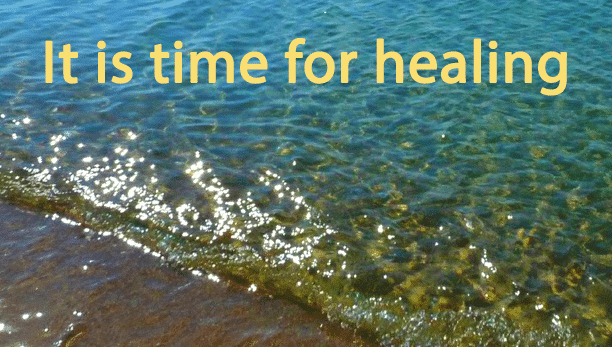
Is all of humanity traumatised? It is a thought that comes to mind very clearly when following the recent, fascinating conversations led by Dr Gabor Maté and experts from many different fields in a week-long event organised by Science & Nonduality (SAND) under the heading The Wisdom of Trauma. It seems like everything which has been ‘swept under the carpet’ is now surfacing big time. We must face our past and respond. It all points towards an urge for transformation. So, it is no surprise that the topic of trauma comes to the centre of our attention in a big way too. We learn that our prisons hold the most traumatised members of our society, that illness is rooted in traumatic stress, that there is generational trauma and that there is something called collective trauma. We find trauma everywhere. However, there is a great promise in understanding this. Because if we start to see the pain that leads to addiction, violence and illness, instead of blaming, punishing and dehumanising each other, we can look into each other’s hearts and notice we have the same longing for acceptance and to be loved. We can start to do our inner work, understand ourselves and walk the path of healing. We must understand ourselves and the pain that dissociated us from our true nature, have compassion and support each other in recovering our innate goodness.
- Dehumanising people does not help anyone. It only makes things worse
- We must learn to humanise those who harm others to liberate them from these roles.
- For transformation, we need to be trauma-informed
- It is crucial to come to know one’s authentic self
- Focus on healing and solutions
- We become what we practice
“Trauma is not what happened to you; it is what happened inside you.”
Gabor Maté’s concise explanation WATCH
Two great dialogues related to trauma and healing from the A Narrative of Love series hosted by Dr Scherto Gill: Thomas Hübl WATCH Dr Joy DeGruy WATCH
A wonderful opportunity
Participate in a workshop led by Four Arrows who for decades have been engaged in bringing awareness to the world of indigenous peoples worldview
We continue to explore our current theme, ‘Towards a Loving World, Leadership and Governance for Well-Being’. We are delighted and very honoured to be able to offer a new chance to participate in workshops held at the 5th SoH Forum in June, as well as to new additions. First in line is Four Arrows:
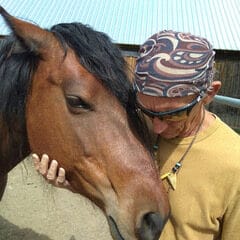
Worldview Reflection as a True Dichotomy and Complementary Thinking Task in Behalf of Human Survival
Welcome to join this workshop
with Wahinkpe Topa (Four Arrows), aka Don Trent Jacobs
Four Arrows, aka Don Trent Jacobs, PhD, Ed.D., is the author of numerous books, peer-reviewed articles and chapters on applications of Indigenous Worldview as a proven solution to our existential world problems. Former Director of Education at Oglala, Lakota College and currently a professor of education for Change at Fielding Graduate University, his academic work, spiritual life and social/ecological justice activism have received international recognition, including a book on his work by Dr Michael Fisher entitled Fearless Engagement of Four Arrows.
Wednesday 20th October at 15.00-16.30 GMT
The workshop is a gift from Four Arrows to Spirit of Humanity Forum, which we gratefully accept and enable us to offer it for free as per our ethos
Coming book
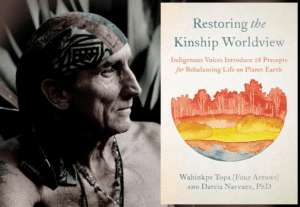
Restoring the Kinship Worldview
Indigenous Voices Introduce 28 Precepts for Rebalancing Life on Planet Earth
By Wahinkpe Topa (Four Arrows) and Darcia Narvaez
“Humans have a particular ecological niche, a role as the custodial species of this earth. We must return our species to this niche within the next decade, or perish. This book, Restoring the Kinship Worldview, is a perfect place to start – the foundation is good relations, making kin both human and non-human – and here we have story from a gathering of some of the finest Indigenous thinkers in the world. Four Arrows and Darcia Narvaez have a particular way of bringing the right people together for such purposes.”
– Tyson Yunkaporta, author of Sand Talk: How Indigenous Thinking Can Save the World
Did you know that Four Arrows is also great pianist?

The Recovery of Love
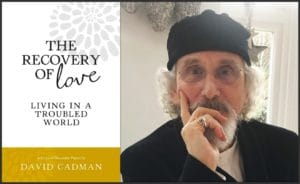
A series of essays by David Cadman, writer, quaker and sometime professor
Last year, I published a book called Love and the Divine Feminine, which explored how it was that we have come to be where we are, who we are, faced with climate breakdown and social division. At the end I asked some questions about what was meant by Love and the Feminine, and whether any gender-based discourse was any longer helpful.
In The Recovery of Love I try and answer these questions, or at least explore them, seeking a new and radical Language of Love as a challenge to all that is holding us back from becoming who we want to be in a troubled world, how we might find a place of love and compassion and a gathering together to care for each other and the Earth. The discussion papers that make up The Recovery of Love are being published from now until the end of the year. They can be read one at a time, and I hope that, together, they offer another way of being, another way to find our place here on Mother Earth. I would be interested to know what you think about all of this and what you are doing to find your own way.
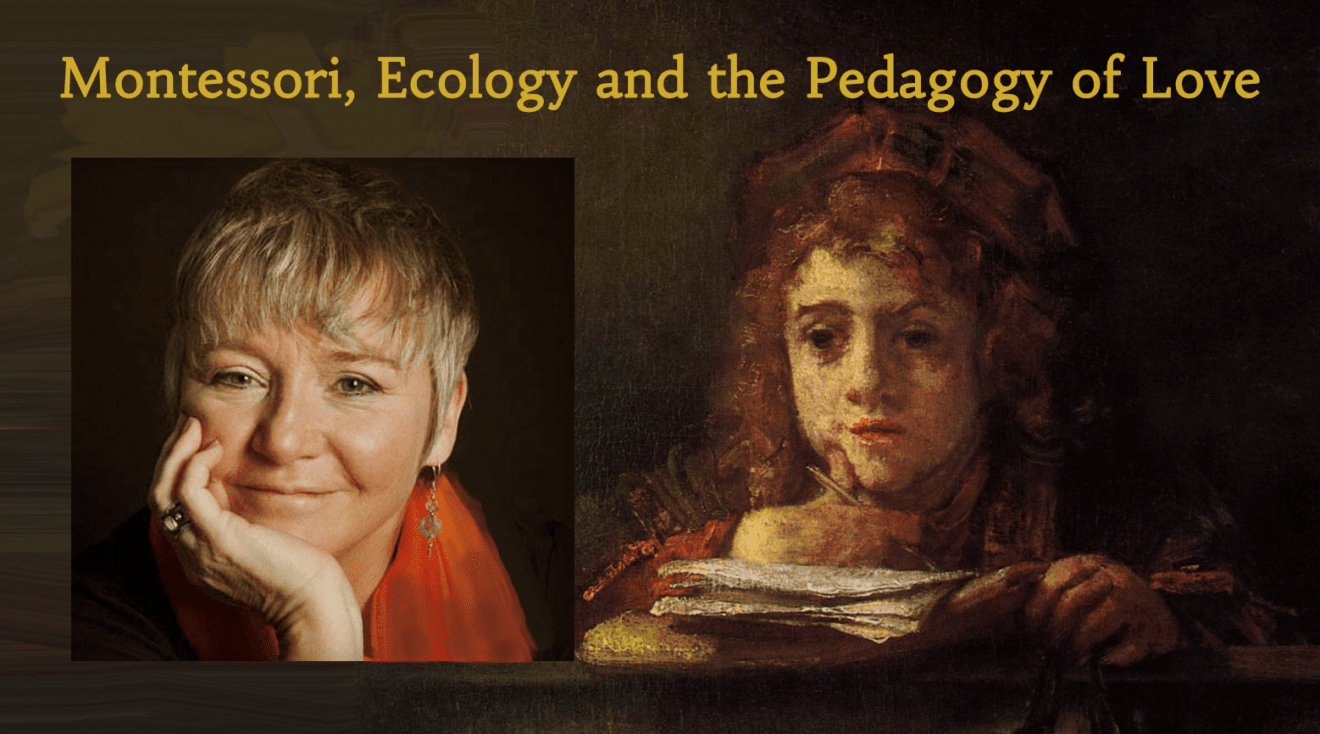
By Wendy Ellyatt, Founder and Chief Executive, Flourish Project
The education of even a very small child, therefore, does not aim at preparing him for school, but for life. —Maria Montessori (1948)
“Sustainable development has the ultimate potential of offering an holistic, transdisciplinary and transformative perspective that can support agencies in the integration of early childhood and family services. A resonance between the concerns of the SDGs and children’s wellbeing is immediately apparent as soon as they are brought together. This should not surprise us too much as this emphasis on the child, the natural environment, and the local and global concerns for humanity can be seen in many of the pioneers of early childhood services, and perhaps especially in the work and writings of Friedrich Frobel, Robert Owen, and Maria Montessori.”
—John Siraj-Blatchford AND Lynnette Brock, 1987
We are currently living in strange and fascinating times, where change is happening at a rate perhaps never before experienced in human history. This, of course, brings with it huge challenges, but it also presents us with huge possibilities related to our shared ability to choose the future that we all really want, rather than the one that might be predictable.
One of the key aspects of this phase is a raised human awareness of how we are all interconnected and how the things that go in one part of the world directly influence other parts. We are also becoming more aware of how our own values, mindsets and internal states have been profoundly influenced by the environments that we have uniquely experienced, and how these states then impact on others. According to the 2019 World Peace Index2, the global economic impact of violence was $14.1 trillion PPP in 2018, equivalent to 11.2 per cent of global GDP or $1,853 per person. There are deep social structures at play that are constantly shaping the emergent patterns of the future, currently with three major divides – spiritual, social and ecological.
To become more aware, we therefore need to explore both the inner and outer aspects of human societies i.e.
Understanding the world from ‘Inside-out’ – how our own backgrounds, experiences, values, thoughts and emotions influence our behaviour and activities
And ‘outside-in’ – how the external pressures and expectations of the systems that we live within (i.e., families, communities, political and religious systems and cultures) influence our thoughts, emotions, values and behaviours.
Compassionate Leadership
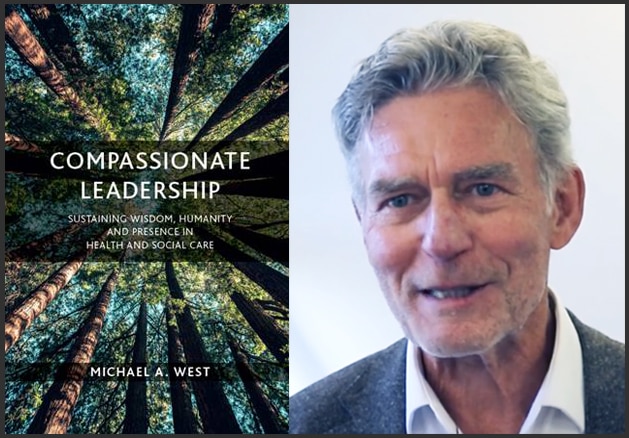
New book by Michael West, Professor of Work and Organisational Psychology
Those who work in health and social care give inspiring support for the health, happiness and well-being of all – communities, societies and nations. Yet their work-places often harm their own health and well-being, affecting care quality, motivation, patient satisfaction and corroding cultures of compassion.
In these pages, an evidence-based approach to transforming the leadership and cultures of health and social care teams and organisations is described. Practical, powerful and compelling, it describes a strategy based on the core human value of compassion, showing that by sustaining that value in health and social care, we can cultivate wisdom, humanity, presence and high-quality in health and care services. Supplemented with practical resources, case examples and searching questions for discussion, it offers a simple, radical and powerfully effective strategy for change.
It is a call for leaders to nurture compassion within themselves and across health and social care institutions, to support healthier and happier institutions and communities. It challenges leaders at every level to have the courage and authenticity to embody compassion in their leadership now and for the long-term future.
Calm and Confident – universal leadership qualities

The wisdom of dogs
Some basic needs apply to all living things. Dog expert Cesar Millan emphasises that peace and security are the keys to developing a good relationship with all animals. He says: “When I enter people’s homes (to get to know a new dog), I always behave very quietly, very calmly because calm builds trust. Then I ask the dog to stay away because it creates respect. I prioritise trust and respect. After that, I express affection. People often interpret this as if I am not very loving because most of my clients like to greet dogs by going directly into their intimate room and expressing affection, but it does not create trust and respect.
Animals read our energy
Cesar says that animals react to the energy we send out and that the energy never lies. Peace and security signal stability and stability is essential energy in the animal world. Dogs like to follow a calm and stable leader. We have the same need. The same applies to us humans. We expect our leaders to be calm and secure. If a dramatic situation occurs, we are more likely to follow the one who remains calm, even if it is not the formal leader.
The value of CALM
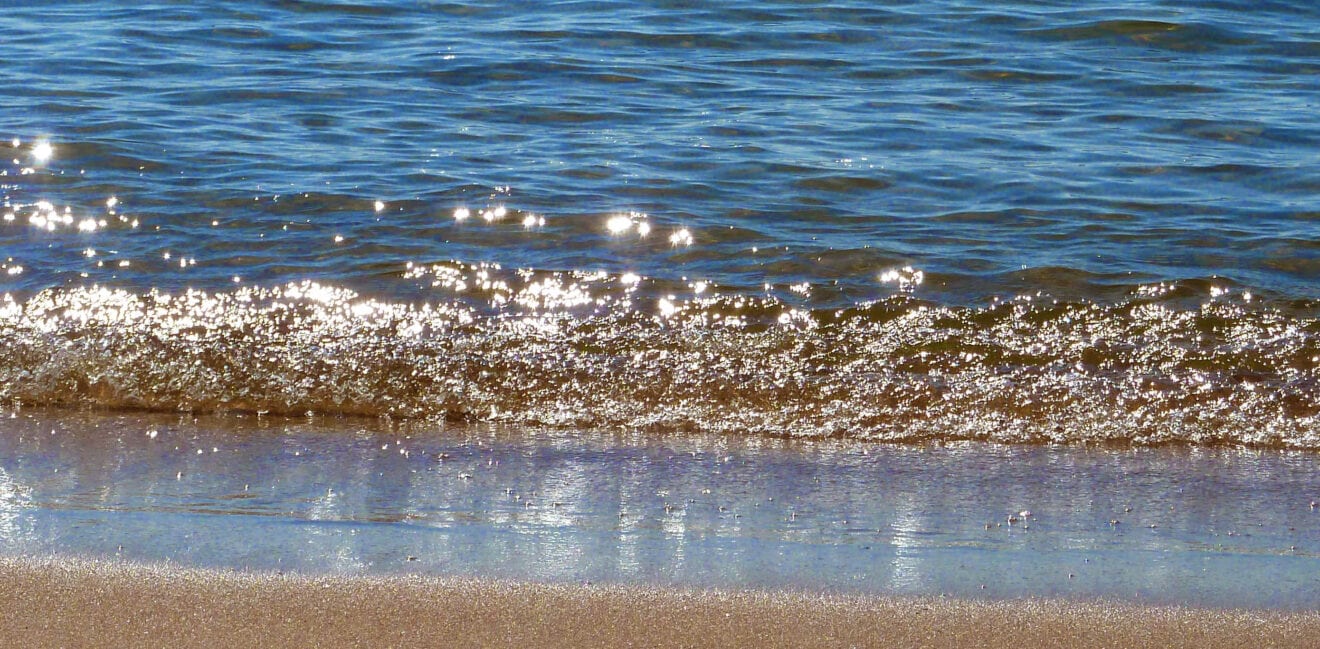
When leaders learn from their people
An inspiring story from everyday life
On the last Monday of August, a colleague and I, went for a weeks ‘resident holiday’ with three of the residents at the home for people with reduced physical and mental functioning, where we work. It was my first experience of a ‘resident holiday’, and I was excited. We drove our minibus to a rented cottage in the countryside. The sun was shining, and the joy of anticipation was great among the three residents. The house contained a swimming pool, air hockey, whirlpool and five rooms. It was located in an open landscape, overlooking fields.
My colleague and I had discussed beforehand what we should see, do, experience, and achieve. We felt that we must give the residents a lot of experiences and that we must be able to show our employer that we had used our time well. So, we had a plan with many options.
On the first day, we unpacked and established ourselves in the house. The residents enjoyed sitting on the terrace with coffee and good food. We talked with them about the plan for the next day. We explained that we were to go on a trip to the nearby fishing village and have lunch at the harbour.
However, the next day as soon as we arrived at the harbour, one of the residents said:
– Now, let’s go back to the cottage…
Spiritual Practice: Play at Work
Inspiration to put into practice from the Fetzer Institute
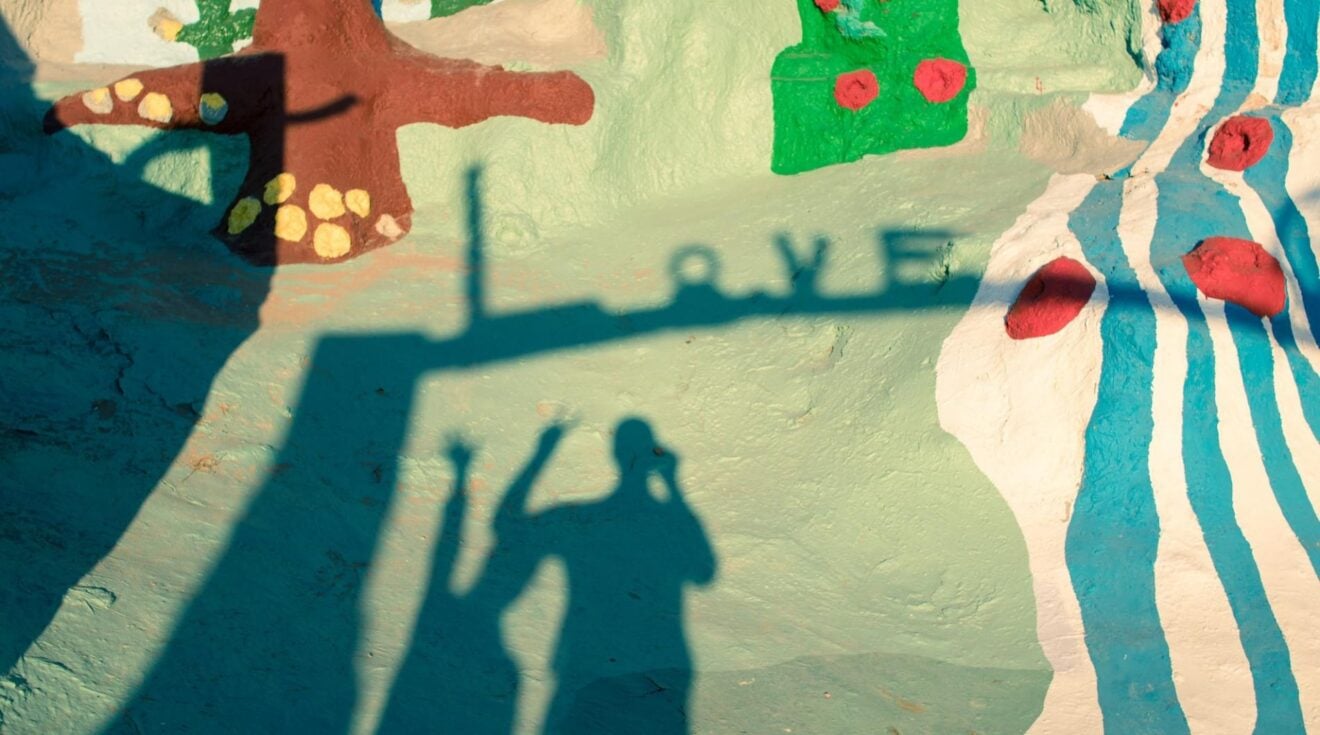
It’s easy to forget how impactful the daily, ordinary moments of our lives can be. Sensei Koshin Paley Ellison, Zen teacher, psychotherapist, and president of the New York Zen Center for Contemplative Care shares what a door person in his building said that moved and reminded him of the impact our most ordinary activities have on others.
Listening to understand more
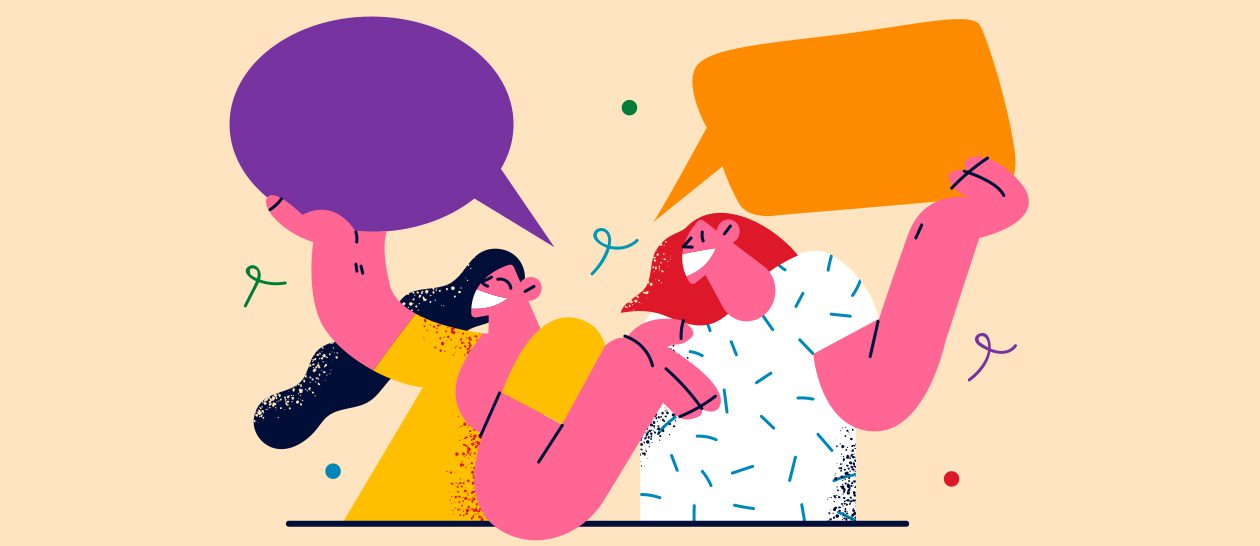
Listening is one of the three pillars of the SoH Forum. Here is a great article from our partner Heartfulness on this important subject.
We can listen in a range of ways. We can listen in attentive silence, offering our alert presence, communicating acceptance, respect or care, without words. Or we might need to listen for factual information – for example in a work meeting – and then we can check back with the speaker if what we have picked up is accurate.
Perspective taking is another way to listen. Paying attention and acknowledging someone’s perspective or opinion, particularly when it is very different from our own, requires us to be centered and to let go of any urge to persuade them they are wrong! If our intention is connection not correction, we first listen for their way of seeing things and then we may reflect back to them our understanding of their perspective. “So, your view is that vaccination should be compulsory for everyone, is that right?” Remember, you don’t need to agree with their perspective, but when someone feels accurately heard, not immediately argued with, not judged, they are much more likely to be open to hearing your perspective also.
Towards a Loving World
Leadership and governance for well-being
Reflections from our community

“The western world is transitioning from a ‘leader as ruler’ model to a ‘leader as servant’ where the role of the leader is not to be served by the people, but rather to serve the people’s needs. This model of leadership is similar to indigenous models of governance that could be described as familial and based on love and relationships, rather than socio-hierarchical and based on rule or law. The modern, industrial world has much to learn from indigenous familial approaches to governance where every member of the family, or society, is cared for, not just those with wealth or power.”
– Corey Lewis
“Leadership is a form of love. We lead because we care, not just about those we lead, but also about the world in which we lead. Is my work adding to the positive energy and wellbeing of everyone? Am I being a force for good and for love in my relationships and my leadership? These principles are crucial in healing our divisions and our planet and its place in the universe.”
– Rose Rudnitski
“We have to believe that a loving world acts as a ripple effect. I may be just a tiny grain, but I can still cause a ripple. And as many other grains come together, our ripples and our effect can achieve wonders… just as it is said: the butterfly that flaps its wings in China can lead to a storm in America.”
– Donia Keith
“We need change. This is clear. What a better way to change than focusing on Love. We are all connected and need to learn how to live and appreciate one another as humans and animals and plants. We need to shift or our existence here on this earth is at risk.”
– Susie Rolander
“My job is CEO of a media company in Belgium, NGroup. Being the media, we have a huge responsibility in the way in which our listeners perceive the world. The great challenge of Humanity – and each of us – is to allow everyone to live with dignity within the limits of the planet. To invent a way of living, collectively, above the social floor (care, food, a roof, a job, a decent income … for all), and below the ecological ceiling (carbon neutrality, good use of resources, preservation of biodiversity). No country in the world is doing that today. This is our challenge as human beings, companies, organisations, nations and media. As media we support that vision. We are not perfect but we act for that vision. With us, when hosts and journalists switch on their microphone, they don’t speak to one million people, one hundred thousand, one thousand or one hundred people. They each speak to only one person, one person that they love. And when you speak to someone you love, you don’t speak in the same way and you don’t use the same words or the same tone of voice. We have decided that through our voices, our words and our songs to sent out positive waves to our listeners. As a medium, we are incredibly lucky to have a resource without limits : the airwaves. We decided to make it a weapon of “mass construction”.
– Marc Vossen
“We are all connected.”
– Eugene Kocherga
“When we lead with love, we are open to receiving greatness.”
– Lisa Corbit
“Power has been seen as the opposite of love. Power and love can inhabit the same space in the body and the interspace between bodies. Leadership for well-being is the leadership of loving power and powerful love. This type of power has been in nature and in the human being, sometimes silent, sometimes dormant, sometimes powerfully present. It is been present in animals and in the way they behave to protect and nurture their species in dynamic equilibrium between species. Loving power and powerful love is the source of a new spirit of leadership.”
– Joao Noronha
“It’s a great theme, I would add at the end “wellbeing for all relatives – humans, animals, plant life, winged nation, grandmother earth.”
– Sina Ikikcu Win Ironcloudtwodogs
“When we start to reconnect with the ground underneath our feet, our beautiful planet earth, we can start to FEEL again – ourselves and others – and leave the numbness and fear that has lead us to the current situation which are trying to change so desperately.”
– Miha Gombos
“We are moving towards those targets. Slowly but continuosly and strongly. Let’s keep on testing our best, as facilitators of the advance and growth of the process!”
– Josune Moneo
“For this cause we all came into the world, tom bear witness to the Truth, the Light that is Love, which reveals our connection.”
– Bruce Robertson
“‘Toward a Loving World’ is a personal decision to walk step by step, meet others with open inviting curiosity and co-operation for a common world in harmony with nature, cosmos and with each other.”
– Astrid Ståhlberg
“With a little sharing, compassion, a well-balanced life, and the need to take a step back to gain wisdom about the big questions of our lives, we can create real desires and give many the opportunity to find the balance to contribute to the change we need and become the leaders of tomorrow. To do this, we must not have well but be well.”
– Jean Francois de Lavison
“Today’s ways aren’t working.”
– Laurel Colless
“I have a quest of a world free from corruption, and that if we can get 50 righteous people we can change the world.”
– Zizipho Ke-tu-rah Dhlamini
“The theme, towards a loving world, leadership and governance for well-being, is not just a title; rather it promises to be a guide and a roadmap for the flourishing of all humanity.”
– Ann Dinan
“After the unprecedented time we have gone through, there is much more need to for a loving world for people to heal from the past and start a fresh.”
– Deepak Salwan
“We rise up as one collective”
– Guðbjörg Eggertsdóttir
“Here on Mother Earth, I believe that our shared purpose as a Human Tribe is to become more aware and more mindful with growing loving kindness towards all that is Sacred in the Web of Life. We weave the Dream together as active participants upholding the Law of One when we understand that all is interconnected. Mitákuye Oyás’iŋ (‘All Are Related’ in the Lakota language).”
– Yvonne Germaine Dufault
“The world urgently need to reset toward a more loving and human-centrist approach. The world is screaming for more authenticity and purpose. We need companies that are more responsible, less individualistic and we really need to leverage community in order to generate long term value and optimise the way we interact, work and live. I trust our future should be built on collective intelligence. Nobody can make better plans by themselves than a group of people can make together. By pooling all of the knowledge and attitudes together, we always come up with better solutions and approaches. So let’s get every brain in the game.”
– Catherine Rey
“I hope this will be the decade where spirituality is put into the equation as the way of being towards a loving world. Most people already have some kind of spiritual practice for their well-being. I hope to see a time where leaders acknowledge the importance of those practices in a work context, allowing for the separation of personal vs work to be over.”
– Maria Bras
“It becomes more relevant if it is sustained with clear actions and measurements of the impact of these actions, as well as a clear review of all educational systems. I am interested in understanding how this can be applied pragmatically and how it can become a reinforced given for any kind of future social development?”
– Kelsey Greene
Fridays for Silence

Building a subtle network of pure thoughts
Every Friday at 11.00am GMT – 15 minutes
Join us in this simple spiritual practice
Empower yourself and help shift human consciousness
Being introvert together
Mikes are automatically turned off. We see each other in small windows on the screen, are first guided by a few words into silence and then just sit in each others presence.
A few words at the end indicate that the time is over.
Site internet: www.sohforum.org

